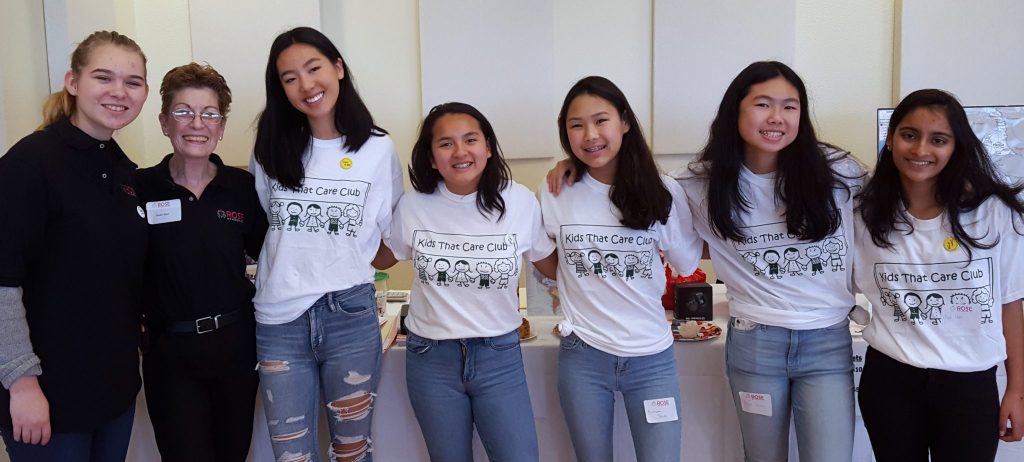Rose Academies, a Santa Clara-based nonprofit founded in 2014 by resident Susan Stasi who is also the organization’s CEO and President, reaches across two continents and an ocean to educate and teach life skills to impoverished girls and deaf students in the heart of Africa. It reaches as far as Cameroon on the west coast of Central Africa, bordering the Atlantic Ocean, and, recently, is reaching east of Cameroon to Uganda.
Rose Academies hosted an open house Jan. 13 at the Santa Clara Senior Center to educate the community about the 17 United Nations Global Goals for Sustainable Development. The campaign, adopted by 193 world leaders at the UN in 2015, aims to end poverty, fight inequality and injustice, and tackle climate change by 2030.
Invited guests from Santa Clara University’s Miller School of Social Entrepreneurship, Santa Clara Law Group, Prospect High School and the African Arts Academy in San Francisco joined Rose Academies in sharing their efforts to make a better world.
Rose focuses its efforts in Africa on achieving four of the UN Global Goals: health and hygiene, quality education, gender equality and access to water and sanitation (www.17goals.org).
“What Rose Academies does is very important: looking at a community that often doesn’t get the support it needs—females in a male-dominated society and the deaf,” said Santa Clara resident Andrew Ratermann, an open house attendee.
In the Sub Sahara, deaf children are often isolated, abused and viewed as a family burden. Rose Academies has partnered with CERSOM School for the Deaf in Bafoussam, Cameroon, an inland city with a population of about 350,000 reported in 2008.
The residential school teaches French sign language, academics and vocational skills. It enrolls 100 students. About 60 live in an associated boarding school, where some beds must be shared by two and even three.
Through Rose, 10 deaf students now have American sponsors, whose support covers tuition, uniforms and educational materials. Rose recently shipped six laptop computers, a printer, sewing machine and school supplies to CERSOM School to enable it to develop its first tech/vocational center (www.cersom.jimdo.com/english/the-cersom).
In Bamenda, the capital of the northwest region of Cameroon, Rose supports the Center for Youth Education and Economic Development, where girls receive training in technology.
In Tiko, Cameroon, Rose has partnered with the NGO Hope for Vulnerables and Orphans, a women’s vocational center. Its health programs, developed by Rose, include workshops on puberty development and menstrual hygiene management.
Rose Academies also takes health programs to rural villages, prisons, orphanages, hospitals, and labor and refugee camps, where it distributes washable sanitary pads made by volunteers in the U.S. and teaches local women how to make their own.
Gender clubs in Cameroon—and a first one in Uganda—encourage adolescents to remain in school.
“Civil conflict in Cameroon this last year has made it extremely difficult to carry out our mission. English speaking schools were shut down for over a year, journalists were incarcerated, internet was closed down, curfews and enforced shutdowns added to the extreme difficulties,” said Stasi. “We are still very active in Cameroon, but have been hampered in development due to this ongoing conflict.”
In March, Stasi will travel to Cameroon and on to Uganda, where Rose Academies hopes to collaborate with a school for the deaf.
“Our collaboration with NGOs on the ground in Cameroon and Uganda gives a multiplier effect to our own initiatives,” said Board of Directors Secretary Carol Buchser.
For more information about its programs and volunteer opportunities with Rose Academies, formerly known as St. Mary de Rosa Academies, visit www.roseacademies.org.
“It is crucial for women to support other women, even those halfway across the world. When Rose Academies gave me the opportunity to do that, I could not pass on it,” said Holly Pyper, who recently joined the Rose Academies team. “We are working to bring basic human rights to women and girls—sustainability, respect and education. It is rewarding. It is necessary. It is important.”
“What inspires me about Rose Academies is the fact that by changing lives, we are changing the world,” said Buchser.
